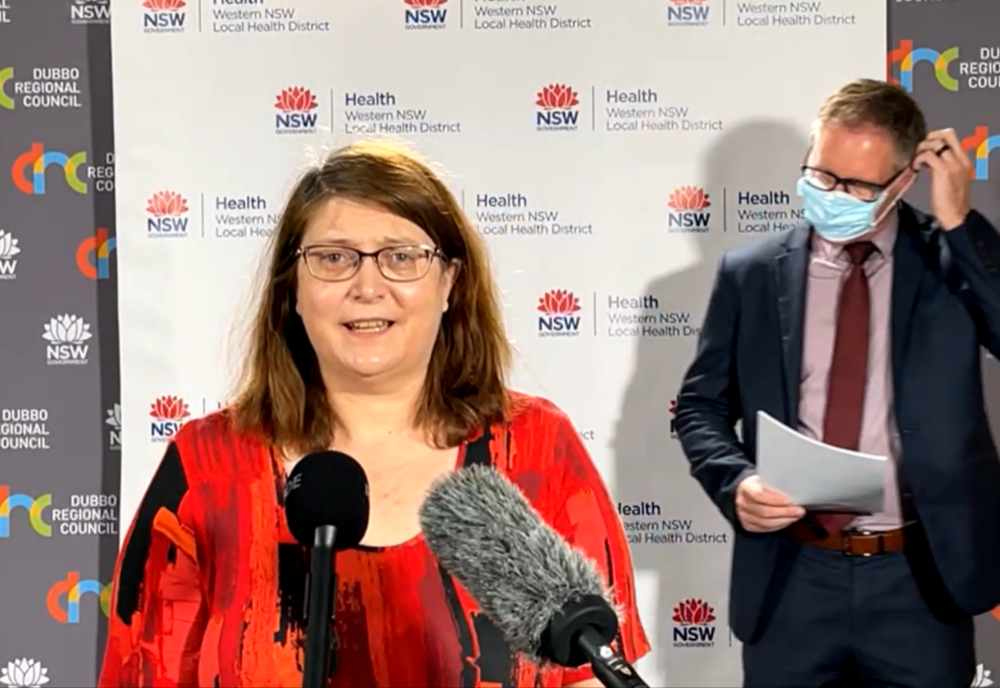Health officials call for 'Super Swab Saturday & Sunday'
Oliver Brown
03 September 2021, 4:08 AM
 NSW Health Public Health Response Branch Chief Medical Officer Dr Jan Fizzell
NSW Health Public Health Response Branch Chief Medical Officer Dr Jan FizzellWith poor weather conditions forecast for this weekend, health authorities from the Western NSW Local Health District are urging people to make it a "super swab Saturday and Sunday".
Despite another day of low testing numbers across the region, the district saw one of its largest spikes in new cases, with a total of 53 up to 8pm last night.
This follows a recent slight rise in testing over the last couple of days and officials say there are likely many more cases yet to be identified in the coming days.
Fifteen (15) of the new cases are from across the Western Plains with one each in Gilgandra and Narromine, two in Walgett and 11 in Bourke shire, mainly at Engonnia.
At the same time, Chief Executive of the WNSWLHD Scott McLachlan once again said specific daily numbers in each LGA should not be the focus.
"The reality is that people are infectious in the community across the whole region," Mr McLachlan said.
"We know that we've seen a growth in numbers every day in the last three weeks - I expect we will see further growth in numbers over the next couple of weeks, particularly with the known household contacts.
"For all the people in isolation at the moment, the vast majority will get this Delta strain - not all the cases have been linked so can I please urge people this weekend to consider it a super swab Saturday and Sunday and please come and get tested, especially seeing as the weather isn't looking great."
A significant number of new venues of concern have also been added in the past 24 hours, most of which in the south eastern part of the district, such as Narromine, Dubbo, Orange and Bathurst.
The full list of venues of concern is available on the NSW Health website. Further sites and more details may be added or removed as investigations continue.
NSW Health's ongoing sewage surveillance program has also recently detected further fragments of the virus at the sewage treatment plants in Walgett, Bourke and Gilgandra, among others.
Mr McLachlan said this was unsurprising considering the currently active cases in the area and should be another motivator for people in these areas to get tested.
Don't blame it on allergies
Testing numbers saw a slight decline yesterday, with just under 4000 tests across the region which health authorities say they want to see more than doubled on a daily basis.
NSW Health Public Health Response Branch Chief Medical Officer Dr Jan Fizzell acknowledged that the beginning of spring marks the start of allergy season.
However, she said they should still consider any symptoms potential signs of COVID-19 and therefore go and get tested so no potential cases are missed.
"One thing we really need to do in order to control and suppress the virus is to find every single case - we've missed cases in the past because people are just passing it off as allergies," Dr Fizzell said.
To get information on testing locations click here and enter your town or postcode.
Editor's Note: Many local testing clinics in the Western Plains area are not currently opening weekends due to low testing numbers so please check and call ahead.
Best vaccination is the one you can get today or tomorrow
Dr Fizzell also spoke about the many opportunities for vaccination - both Pfizer and AstraZeneca - across all communities right now, as well as clarifying the reason why the timeframe between doses for the latter had recently reduced by more than half.
She said the Therapeutic Goods Administration (TGA) had approved the vaccines to be taken between four and 12 weeks when they first came to Australia.
"When we had no COVID in our community, that slightly increased protection - it is only slight - we said 12 weeks," she said.
"Now we've got COVID in our community, we want everyone protected as soon as possible - shortening that interval to for weeks means we've got more people protected during our current epidemic.
"You get some protection from that first dose of both vaccines but what seals the deal is that second dose."
Dr Fizzel said the recommended timeframe between first and second dose of Pfizer may also increase from three to six weeks.
"We're trying really hard wherever we can to have everyone have that first dose as soon as they can and that second dose within that four to six week period - that's our ideal sweet spot for both vaccines."
An updated list of currently available pop-up vaccination clinics across the region can be found here.
Other vaccination opportunities are also available at countless GPs, participating pharmacies and Aboriginal Medical Services.
For all the latest information about COVID-19 across the Western Plains, including some helpful links, check out our in-app COVID-19 button.